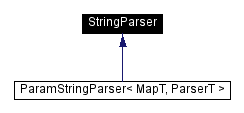
#include <stringparser.h>
Inheritance diagram for StringParser:

As implemented, it supports only the basic reading of integers and doubles as numeric constants, copies strings verbatim, ignores pointers, and breaks lines into words without taking quotes, comments, etc. into account.
The pointer version of parsing for a datatype [parse(s,T*&x)] has the same semantics as the regular version, except that it is possible that the pointer itself might be changed by the expression. (This implementation does not have any way to actually specify a pointer in a string, but derived classes can provide a mechanism for that.) The supplied pointer must already be valid, since any regular value found will be placed into the pointee. Any client that would like to support such pointer expressions should use the pointer form instead of the regular form (i.e. double* instead of double).
For convenience in expressions, the parsed value is returned in both the return type and in the supplied variable. (Of course, the variable is required to be in the argument list so that the correct return type can be deduced.)
Often this class will be overridden with a more capable class, which can e.g. accept expressions from which the actual value may be computed based on known values of variables, implement quoting, etc. Derived classes may raise exceptions or print error messages during the parsing, but they must always return a legal value of the indicated type.
Unfortunately, C++ does not implement virtual templates, or else the basicparse() routine could have just been called parse() and some of the others eliminated. Had that been done, however, no derived class could override the operations since they would not have been virtual. So, alas, the types must be limited to those enumerated here.
Definition at line 55 of file stringparser.h.
Public Types | |
| typedef std::vector< string > | arglist |
| Type for the result of parsing a string into a list of strings. | |
|
typedef std::vector< string >::iterator | arglist_iterator |
| Iterator for an arglist. | |
|
typedef std::vector< string >::iterator | argptr |
| Shorter alias for arglist_iterator. | |
|
typedef std::vector< string >::const_iterator | const_argptr |
Public Methods | |
| StringParser (const StringParser &) | |
| Copy constructor. | |
| virtual StringParser * | clone () const |
| Return a duplicate of the current object. | |
| virtual string | parse (const string &s) const |
| Short version of parse() for simple string substitution. | |
| virtual void | error (const string &) const |
| This implementation ignores errors (since it doesn't generate any), but derived classes may redefine this function if they wish (for instance, to write messages to the console). | |
Family of parse functions differing only by their return datatypes | |
| virtual double & | parse (const string &s, double &x) const |
| Parse into a double. | |
| virtual int & | parse (const string &s, int &x) const |
| Parse into an int. | |
| virtual Tristate & | parse (const string &s, Tristate &x) const |
| Parse into a Tristate. | |
| virtual string & | parse (const string &s, string &x) const |
| Parse into a string. | |
| virtual double *& | parse (const string &s, double *&x) const |
| Parse into a pointer to a double. | |
| virtual int *& | parse (const string &s, int *&x) const |
| Parse into a pointer to an int. | |
| virtual Tristate *& | parse (const string &s, Tristate *&x) const |
| Parse into a pointer to a Tristate. | |
| virtual string *& | parse (const string &s, string *&x) const |
| Parse into a pointer to a string. | |
| virtual arglist & | parse (const string &s, arglist &x) const |
| Parse into a vector of strings by breaking at word boundaries. | |
 1.3-rc2
1.3-rc2